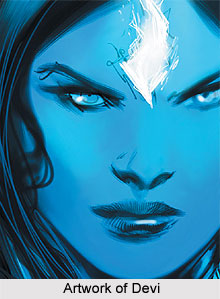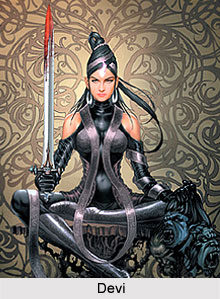 Devi is an Indian comics series, published and distributed in India and abroad by Liquid Comics, which was earlier known as Virgin Comics. The character and concept of the Indian comics series Devi was created by renowned and critically acclaimed Indian filmmaker Shekhar Kapur for the original Virgin Comics. The series was incorporated in the initial Shakti line of Indian comics that focused on stories based on Indian mythology and history. Devi is one of the most prominent characters in Indian comics series which is inspired by the character of Goddess Durga. The script is written by Samit Basu and Siddharth Kotian and illustrations are done by Saumin Patel and Mukesh Singh. According to the story, the character of Devi is portrayed by an innocent young woman named Tara Mehta who lives in the city of Sitapur in futuristic India. Tara is unaware that is set become the focus of a divine clash between the Gods and the demon Bala. Devi is an inspirational story about a woman who strives to survive in a land of ancient legends, fate and duty.
Devi is an Indian comics series, published and distributed in India and abroad by Liquid Comics, which was earlier known as Virgin Comics. The character and concept of the Indian comics series Devi was created by renowned and critically acclaimed Indian filmmaker Shekhar Kapur for the original Virgin Comics. The series was incorporated in the initial Shakti line of Indian comics that focused on stories based on Indian mythology and history. Devi is one of the most prominent characters in Indian comics series which is inspired by the character of Goddess Durga. The script is written by Samit Basu and Siddharth Kotian and illustrations are done by Saumin Patel and Mukesh Singh. According to the story, the character of Devi is portrayed by an innocent young woman named Tara Mehta who lives in the city of Sitapur in futuristic India. Tara is unaware that is set become the focus of a divine clash between the Gods and the demon Bala. Devi is an inspirational story about a woman who strives to survive in a land of ancient legends, fate and duty.
Content of Devi
 The Gods created Devi as a celestial warrior goddess in order to fight the traitor Lord Bala during the 2nd century of mankind. When Bala emerged again to destroy the universe, Devi was reincarnated within a young woman known as Tara Mehta. Devi appeared in the Durapasya clan and had led the soldiers of the gods to an attack on the fortress of Bala. Devi eventually defeated Bala and as a result the fallen god became blinded, captured, and imprisoned by the ultimate Lord of creation, Bodha, inside the fortress of fire and stone known as Jwala, Devi created a source to hold the prayers of humanity and channel them to Aakashik. Aakashik is regarded as heaven in the plotline. She replenished the powers of other pure gods as well.
The Gods created Devi as a celestial warrior goddess in order to fight the traitor Lord Bala during the 2nd century of mankind. When Bala emerged again to destroy the universe, Devi was reincarnated within a young woman known as Tara Mehta. Devi appeared in the Durapasya clan and had led the soldiers of the gods to an attack on the fortress of Bala. Devi eventually defeated Bala and as a result the fallen god became blinded, captured, and imprisoned by the ultimate Lord of creation, Bodha, inside the fortress of fire and stone known as Jwala, Devi created a source to hold the prayers of humanity and channel them to Aakashik. Aakashik is regarded as heaven in the plotline. She replenished the powers of other pure gods as well.
In a future, an innocent woman named Tara Mehta is born as the unawakened form of the reincarnated Devi. She lives a classy and stylish lifestyle with her boyfriend Iyam. He owns a nightclub named The Abyss and is also the most disreputable Gang-Lord of Sitapur. Rahul Singh, a functioning alcoholic Inspector of the Sitapur police investigates and finds out that Iyam is a highly dangerous criminal. It is also portrayed in the story that Inspector Rahul Singh possesses some supernatural abilities. As the story progresses, an Apsara named Kratha who is an assassin of heaven is hired by Lord Bala through a woman named Amara Gaelle. As she tries to kill Tara Mehta before she transforms into the Devi, followers of Durapasya kidnap her before Tara is eliminated.
Later Tara Mehta meets with the first Devi who guides her on ajourney of sel-discovery that will lead to the awakening of the Devi. Inspector Rahul Singh tracks Iyam to a private meeting with Amara where he gains information about the assassination attempt. Iyam pays Kratha a lumpsome amount while Amara murders the bodyguards of Iyam who captured Rahul Singh. Thus she rescued him and goes on her own personal mission. The story forwards with the awakening of Devi and the events that lead to the final encounter between Tara and Bala.
Publications of Devi
The first series of Devi consists of 16 issues written by Samit Basu and Saurav Mohapatra and illustrated by various artists like Aditya Chari, Saumin Patel, Siddharth Kotian and others. The issues include Bhairavi, Dwija, Namaha, Prarambh, Aagaman, Samsara, Sandeha, Aks, Yudh, Samvara, Ateeta, Ahwaan etc.



















